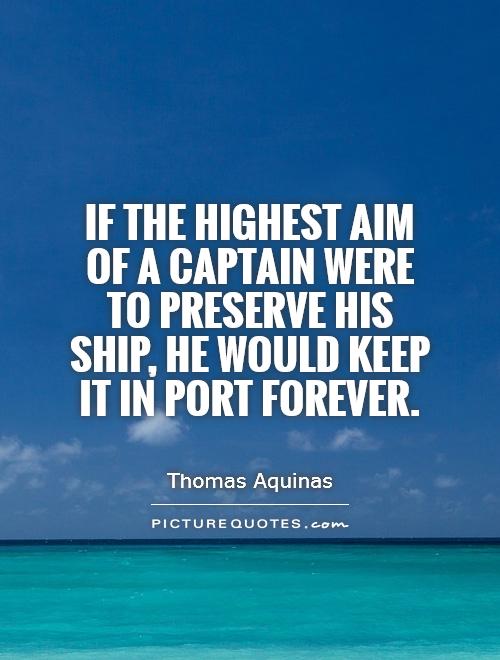If the highest aim of a captain were to preserve his ship, he would keep it in port forever

If the highest aim of a captain were to preserve his ship, he would keep it in port forever
Thomas Aquinas, a renowned theologian and philosopher of the Middle Ages, believed in the importance of balancing prudence and courage in decision-making. His teachings on ethics and morality often emphasized the need to consider the greater good when making choices. The quote, "If the highest aim of a captain were to preserve his ship, he would keep it in port forever," can be understood in the context of Aquinas' philosophy as a reflection of the need to take risks and make sacrifices in order to achieve noble goals.Aquinas believed that human beings are rational creatures capable of making moral decisions based on reason and virtue. He argued that prudence, or practical wisdom, is essential for making good choices that lead to the common good. In the case of the captain and his ship, Aquinas would likely argue that the captain's primary goal should not be simply to preserve the ship at all costs, but rather to navigate it safely to its destination. This may require taking calculated risks and facing challenges along the way.
Aquinas also believed in the importance of courage, or fortitude, as a virtue that enables individuals to overcome fear and persevere in the face of adversity. The captain of a ship must have the courage to venture out into the open sea, knowing that there are dangers and uncertainties ahead. If he were to remain in port out of fear of potential harm to his ship, he would never fulfill his duty as a captain to transport goods, passengers, or fulfill his mission.












 Friendship Quotes
Friendship Quotes Love Quotes
Love Quotes Life Quotes
Life Quotes Funny Quotes
Funny Quotes Motivational Quotes
Motivational Quotes Inspirational Quotes
Inspirational Quotes